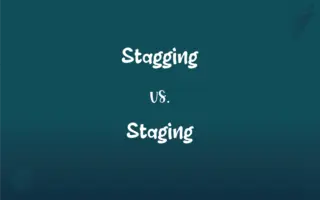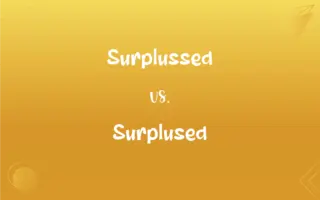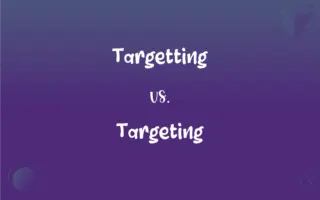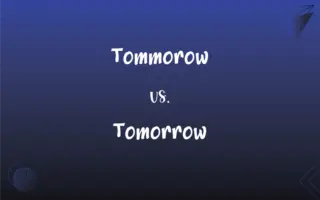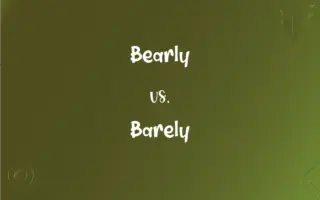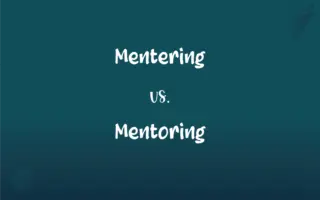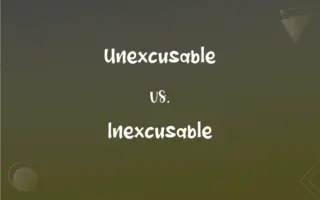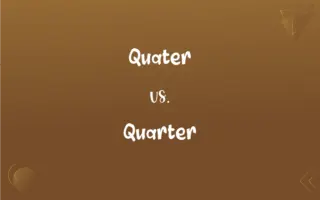Protaganist vs. Protagonist: Mastering the Correct Spelling
Edited by Aimie Carlson || By Janet White || Published on March 11, 2024
"Protaganist" is incorrect; the correct spelling is "protagonist," which refers to the main character in a story or drama.

Which is correct: Protaganist or Protagonist
How to spell Protagonist?

Protaganist is Incorrect

Protagonist is Correct
ADVERTISEMENT
Key Differences
The "agon" in "protagonist" hints at the struggle or conflict they face.
Break it down: "pro-ta-gon-ist" to remember each segment of the word.
Recall "pro" as in professional; the protagonist is the 'pro' character.
Associate "ist" with specialist; the protagonist is key to the story.
"Protagonist" includes "tag," as they often carry the story's tagline.
ADVERTISEMENT
Correct usage of Protagonist
The movie's protaganist was loved by all.
The movie's protagonist was loved by all.
In the novel, the main protaganist faces many challenges.
In the novel, the main protagonist faces many challenges.
She was the protaganist in the play.
She was the protagonist in the play.
The story's protaganist goes on a remarkable journey.
The story's protagonist goes on a remarkable journey.
Protagonist is the hero of the story.
Protagonist Definitions
Leading figure in a cause.
The activist was a protagonist in the environmental movement.
Central figure in a situation.
She emerged as the protagonist in the negotiation.
Main character in a story.
In the novel, the protagonist faces numerous challenges.
Hero of a narrative.
The protagonist's journey captivates the audience.
Key player in an event.
The scientist became a protagonist in the discovery.
The main character in a work of fiction, as a play, film, or novel.
In ancient Greek drama, the first actor to engage in dialogue with the chorus, in later dramas playing the main character and some minor characters as well.
A leading or principal figure.
The leader of a cause; a champion.
Usage Problem A proponent; an advocate.
(authorship) The main character, or one of the main characters, in any story, such as a literary work or drama.
A leading person in a contest; a principal performer.
(proscribed) An advocate or champion of a cause or course of action.
One who takes the leading part in a drama; hence, one who takes lead in some great scene, enterprise, conflict, or the like.
Shakespeare, the protagonist on the great of modern poetry.
A person who backs a politician or a team etc.;
All their supporters came out for the game
They are friends of the library
The principal character in a work of fiction
Protagonist Sentences
In our favorite movie, the protagonist learns the value of friendship.
The protagonist of the story teaches us the importance of bravery.
The protagonist in the game has to solve puzzles to advance.
Every book has a protagonist who faces some form of conflict.
The protagonist shared wisdom that he had gained on his journey.
In the fairy tale, the protagonist defeats the dragon to save the kingdom.
The protagonist found a magic key that unlocked a hidden world.
In the history lesson, we learned about a real-life protagonist who changed the course of events.
Our project is to create a poster of the book's protagonist.
The protagonist had to make a tough choice to save his family.
Protagonist Idioms & Phrases
Face of the protagonist
The most important and central character in a story.
In every superhero movie, the face of the protagonist is someone who stands up against evil.
The heart of the protagonist
Refers to the protagonist's core qualities, such as bravery and compassion.
The heart of the protagonist was revealed through his selfless actions.
Test of the protagonist
A challenge that proves the main character's qualities.
The test of the protagonist was to defeat the dragon and save the kingdom.
Voice of the protagonist
How the main character expresses their thoughts and feelings.
The voice of the protagonist in the novel is strong and clear.
Shadow of the protagonist
The antagonist or the main character's rival.
The shadow of the protagonist proved to be a formidable opponent.
Rise of the protagonist
The process through which the main character overcomes challenges.
The rise of the protagonist was inspiring to watch.
Awakening of the protagonist
When the main character realizes their true potential.
The awakening of the protagonist was a pivotal moment in the story.
Guiding the protagonist
Someone who helps direct the main character on their path.
The wise mentor ended up guiding the protagonist towards his destiny.
Challenge to the protagonist
An obstacle the main character must overcome.
The challenge to the protagonist was greater than any he had faced before.
FAQs
Why is it called protagonist?
It's called "protagonist" from Greek "protagonistes," meaning the first actor or chief combatant, reflecting the character's central role.
What is the verb form of protagonist?
"Protagonist" is a noun; it does not have a verb form.
What is the root word of protagonist?
The root word of "protagonist" is Greek "protagonistes," with "proto-" meaning first and "agonistes" meaning actor or competitor.
Which vowel is used before protagonist?
The vowel "o" is used before "protagonist."
Which article is used with protagonist?
The article "the" is often used, as in "the protagonist."
Is protagonist a negative or positive word?
"Protagonist" is neutral, though it often has a positive connotation due to its association with the main character or hero.
Which conjunction is used with protagonist?
Conjunctions like "and" can be used, as in "protagonist and antagonist."
Is protagonist a noun or adjective?
"Protagonist" is a noun.
What is the pronunciation of protagonist?
Protagonist is pronounced as /prəˈtæɡənɪst/.
Is protagonist an adverb?
No, "protagonist" is not an adverb.
Is protagonist a countable noun?
Yes, "protagonist" is a countable noun.
What is a stressed syllable in protagonist?
The stressed syllable in "protagonist" is the second syllable, tag.
What is the singular form of protagonist?
The singular form is "protagonist."
What is the plural form of protagonist?
The plural form is "protagonists."
Which preposition is used with protagonist?
The preposition "of" is commonly used with protagonist, as in "protagonist of the story."
What part of speech is protagonist?
"Protagonist" is a noun.
Which determiner is used with protagonist?
Determiners like "the" or "a" can be used with "protagonist."
What is the first form of protagonist?
As "protagonist" is a noun, it does not have verb forms. The term remains "protagonist."
What is the second form of protagonist?
There is no second form; "protagonist" does not change form as it is not a verb.
What is the third form of protagonist?
Similarly, there is no third form for "protagonist."
Is protagonist an abstract noun?
No, "protagonist" is a concrete noun, referring to a specific character or figure.
Is protagonist a vowel or consonant?
The word "protagonist" starts with a consonant.
Is the protagonist term a metaphor?
"Protagonist" can be used metaphorically to describe a leading figure in any scenario, not just literature.
How many syllables are in protagonist?
There are four syllables in "protagonist."
How do we divide protagonist into syllables?
Protagonist is divided into syllables as pro-tag-o-nist.
Is protagonist a collective noun?
No, "protagonist" is not a collective noun.
Is the word protagonist imperative?
No, "protagonist" is not used in the imperative form; it's a noun.
How is protagonist used in a sentence?
"The protagonist of the story overcomes adversity with courage and determination."
What is another term for protagonist?
Another term for "protagonist" is "main character" or "hero."
What is the opposite of protagonist?
The opposite of "protagonist" is "antagonist," the opposing force or character.
About Author
Written by
Janet WhiteJanet White has been an esteemed writer and blogger for Difference Wiki. Holding a Master's degree in Science and Medical Journalism from the prestigious Boston University, she has consistently demonstrated her expertise and passion for her field. When she's not immersed in her work, Janet relishes her time exercising, delving into a good book, and cherishing moments with friends and family.
Edited by
Aimie CarlsonAimie Carlson, holding a master's degree in English literature, is a fervent English language enthusiast. She lends her writing talents to Difference Wiki, a prominent website that specializes in comparisons, offering readers insightful analyses that both captivate and inform.


